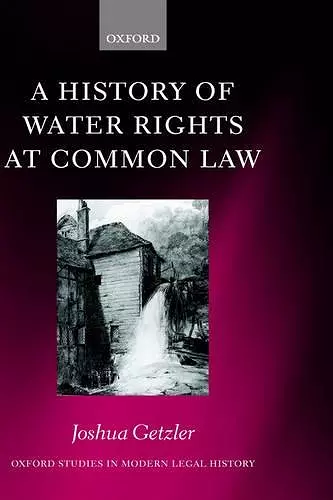A History of Water Rights at Common Law
Format:Hardback
Publisher:Oxford University Press
Published:29th Jan '04
Currently unavailable, and unfortunately no date known when it will be back
This hardback is available in another edition too:
- Paperback£61.00(9780199207602)

Winner of the Peter Birks Prize for Outstanding Legal Scholarship, 2005
Describes how the courts created rights for land owners and users competing to appropriate water for factories, town supply, drainage, and transport. This book covers the period from early times to the late 19th century, illustrating the changing common law of property and tort, and throwing light on the growth of the economy.Water resources were central to England's precocious economic development in the thirteenth and sixteenth centuries, and then again in the industrial, transport, and urban revolutions of the late eighteenth and early nineteenth centuries. Each of these periods saw a great deal of legal conflict over water rights, often between domestic, agricultural, and manufacturing interests competing for access to flowing water. From 1750 the common-law courts developed a large but unstable body of legal doctrine, specifying strong property rights in flowing water attached to riparian possession, and also limited rights to surface and underground waters. The new water doctrines were built from older concepts of common goods and the natural rights of ownership, deriving from Roman and Civilian law, together with the English sources of Bracton and Blackstone. Water law is one of the most Romanesque parts of English law, demonstrating the extent to which Common and Civilian law have commingled. Water law stands as a refutation of the still-common belief that English and European law parted ways irreversibly in the twelfth century. Getzler also describes the economic as well as the legal history of water use from early times, and examines the classical problem of the relationship between law and economic development. He suggests that water law was shaped both by the impact of technological innovations and by economic ideology, but above all by legalism.
Some historical studies are so carefully done that they describe their subject definitively. Other scholars may question why the events occurred as they did, but they will not challenge how these events are described. In this sense, Getzler's book is the definitive study of water rights at common law. ... Getzler's work will bring the reader as close as any study could to what happened, and to what was in the minds of those who made it happen. * James Gordley, Law Quarterly Review *
With the appearance of Joshua Getzler's exhaustive treatment of the history of water rights at common law, at last there is a law book to match the importance of its subject. ... a substantial intellectual feast. * Michael Taggart, Legal Studies *
... the first comprehensive study of the history of English water law...a lucid account...[Getzler] seems equally at home in the medieval period... as with the later developments circa 1580-1750, or with the development of the modern law in the nineteenth century. The depth of learning is just as impressive as its scope, with copious references provided throughout. * Jonathan Morgan, Journal of Legal History *
No stone has been left unturned in order accurately to assess this development [of water rights]. ... A History of Water Rights at Common Law stands as a significant achievement in the career of its author. * Christian Witting, Modern Law Review *
- Winner of Winner of the Peter Birks Prize for Outstanding Legal Scholarship, 2005.
ISBN: 9780198265818
Dimensions: 241mm x 161mm x 27mm
Weight: 761g
446 pages